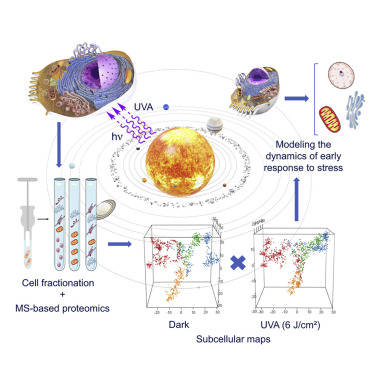Spatial Proteomics
Engaged in the meticulous cartography of protein localization within biological specimens, spatial proteomics delves into the subcellular positioning and dispersion of proteins, furnishing details on the spatial architecture of these molecular entities. Drawing upon extensive expertise, Creative Proteomics extends top-tier spatial proteomics services, delivering valuable perspectives for your protein-focused investigations.
What is Spatial Proteomics
At the forefront of scientific inquiry, spatial proteomics constitutes a progressive domain delving into the subcellular positioning and dispersion of proteins within the intricate milieu of tissues and organs. Diverging from conventional proteomics methodologies, this field surpasses by offering spatial intelligence, unveiling the elaborate arrangement of proteins within designated cellular compartments. Through comprehension of the spatial disposition of proteins, researchers accrue invaluable perspectives on cellular functionality, signaling pathways, and the nuanced interplay among diverse cell types within tissues.

Fig.1 Schematic of spatial proteomics (Valerio, H. P., et al.; 2022)
The realm of spatial proteomics encompasses the meticulous delineation of protein localization within biological samples. Employing methodologies like immunohistochemistry, in situ hybridization, and mass spectrometry imaging, practitioners aim to visually depict and quantitatively assess the spatial dispersion of proteins. Immunohistochemistry facilitates the visualization of distinct proteins within tissues, and mass spectrometry imaging affords the simultaneous spatial mapping of multiple proteins. These techniques endow a spatial framework for understanding the abundance and functionality of proteins, unveiling the complex spatial arrangement of the proteome within biological specimens.
Applications of Spatial Proteomics
Neuroscience
In neuroscience, understanding the spatial distribution of proteins in the brain helps elucidate neuronal circuitry and identify molecular markers associated with specific brain regions.
Cancer Research
In cancer research, spatial proteomics aids in characterizing the tumor microenvironment, identifying protein expression patterns within cancer cells and their surrounding stroma.
Developmental Biology
In developmental biology, studying the spatial proteome provides insights into tissue morphogenesis and the establishment of spatially defined cell types.
In the realm of clinical research, the utility of spatial proteomics transcends, augmenting our comprehension of disease pathology and aiding in the identification of biomarkers with diagnostic and therapeutic implications. With ongoing technological advancements, spatial proteomics harbors the potential to unveil the nuanced intricacies of cellular organization and function in both health and disease states.
Our Service
With advanced protein detection technology, Creative Proteomics provides targeted solutions for researchers and scientists to help them utilize powerful analytical techniques to reveal the complexity of the proteome. With our thoughtful and detailed services, you can choose any protein analysis, including qualitative, quantitative, targeted and PTM analysis, and we will provide you with a detailed plan according to your requirements. The spatial proteomics service process is as follows:

Fig.2 Spatial proteomics workflow
- Sample Preparation
Proper extraction and preparation of proteins from samples to ensure retention of specific cell compartments. - Enrichment
Enrichment techniques are used to isolate proteins or peptides from specific cell compartments. This step is critical because proteins in specific cell compartments are usually less abundant compared to total cellular proteins. - Detection
Immunohistochemistry, in situ hybridization, and mass spectrometry imaging are powerful tools for the identification and quantification of peptides, and they provide detection information that facilitates a comprehensive analysis of specific cell compartments proteome. - Bioinformatics Analysis
The raw mass spectrometry data undergoes bioinformatics analysis to identify proteins, quantify their abundance, and infer potential functional roles. - Result Delivery
After professional data analysis, we deliver results quickly and consistently.
Creative Proteomics brings a wealth of experience to the field of protein research. Our comprehensive services and products cover the entire spectrum of utilizing suitable and efficient gateways. Utilizing our proprietary platform, we have successfully implemented many proteomics research projects. If you are interested, please contact us for more information and a quote.
Reference
- Valerio, H. P.; et al. Spatial proteomics reveals subcellular reorganization in human keratinocytes exposed to UVA light. iScience. 2022, 25(4): 104093

